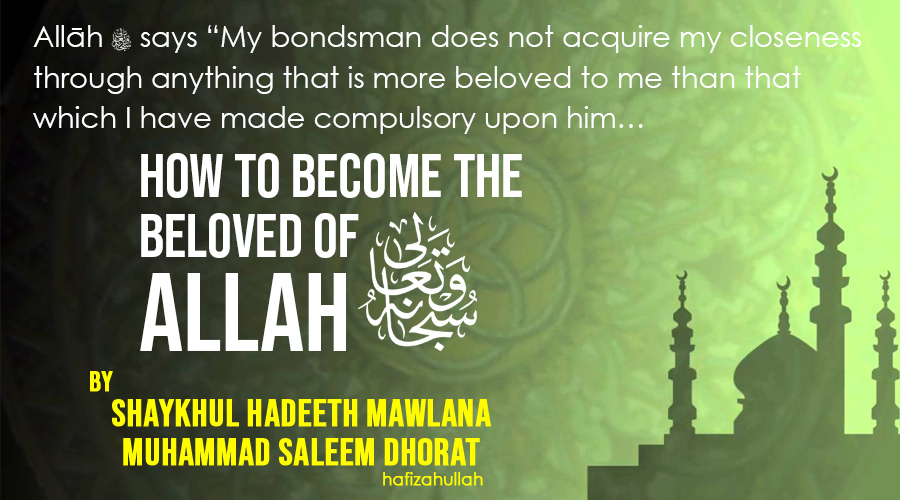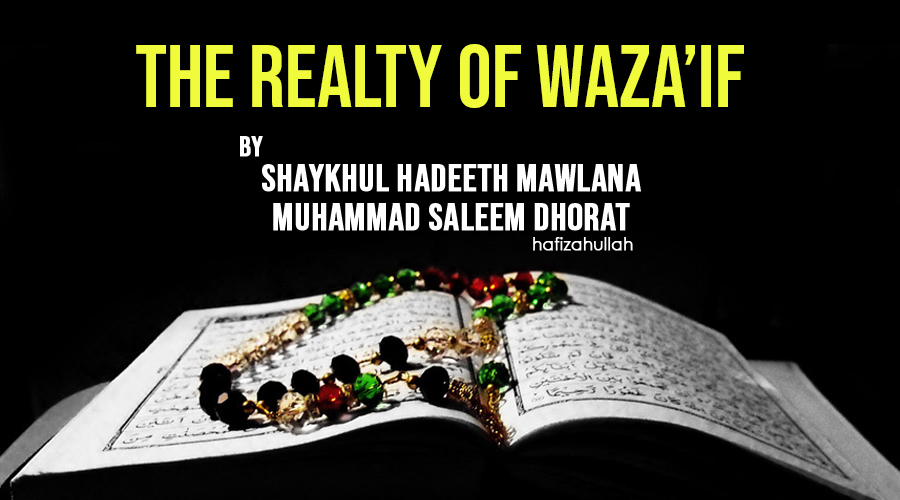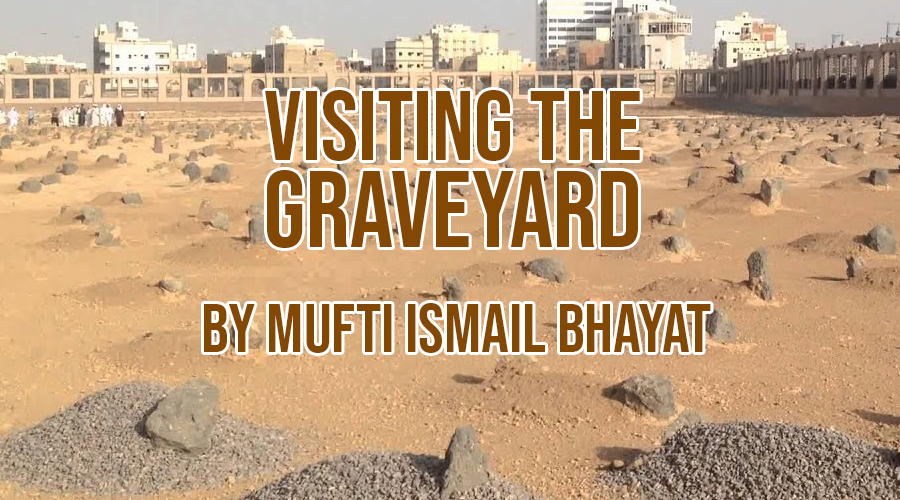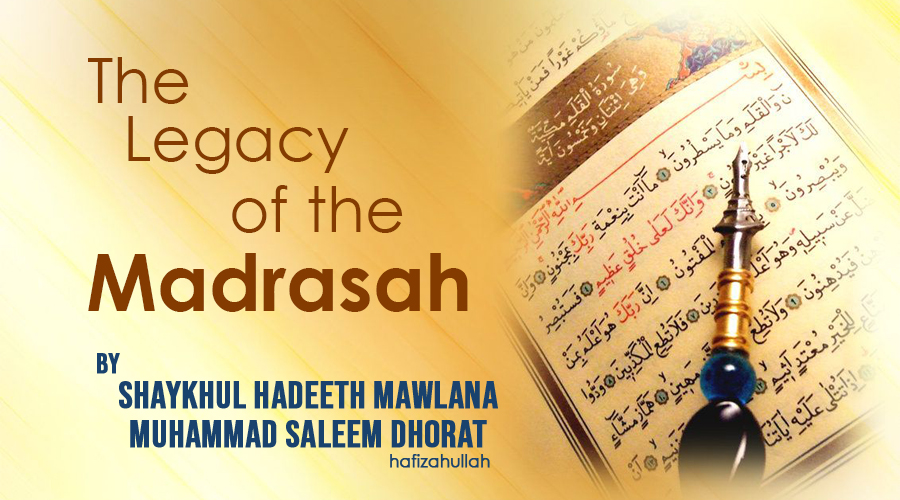
How To Become The Beloved Of Allah
Imām Al-Bukhārī rahimahullāh narrates a hadīth qudsī:
Allāh سُبْحَانَهُ وَ تَعَالَى says: “…My bondsman does not acquire my closeness through anything that is more beloved to me than that which I have made compulsory upon him…
The performance of the farā’idh is by far the greatest and most effective tool in achieving the closeness of Allāh سُبْحَانَهُ وَ تَعَالَى, as nothing can bring a person closer to Allāh سُبْحَانَهُ وَ تَعَالَى than the farā’idh. Farā’idh encompasses every obligation, be it from the DOs or the DON’Ts; just as it is fard to perform the five times salāh, it is fardh to abstain from adultery, stealing, etc.
The struggle and effort in accomplishing the farā’idh create a special bond between the servant and his Master.
Once this bond is created, the servant becomes consistent and steadfast as in fulfilling his obligations. This results in his closeness and relationship becoming stronger and his love for Allāh سُبْحَانَهُ وَ تَعَالَى increases.
As a result, the urge to progress further intensifies and the servant begins to enhance and add to his worship by way of nawāfil (optional deeds) and non-obligatory actions.
This struggle and striving of his attracts the special attention of Allāh سُبْحَانَهُ وَ تَعَالَى and the servant now becomes the beloved of Allāh سُبْحَانَهُ وَ تَعَالَى as the hadīth continues:
“…and then my bondsman continues to acquire my closeness through nawāfil until I love him…
What more can a servant desire? He is now the beloved of Allāh سُبْحَانَهُ وَ تَعَالَى? Allāh سُبْحَانَهُ وَ تَعَالَى ’s special attention is now directed towards him and he reaches such a level that Allāh سُبْحَانَهُ وَ تَعَالَى takes care of all his affairs. Allāh سُبْحَانَهُ وَ تَعَالَى protects him from all directions; he is safeguarded from going astray, he is protected from vice, he is protected from physical and mental calamities as the hadīth further states:
“…And when I love him, I become his ears with which he hears, and his eyes with which he sees, and his hands with which he grasps, and his feet with which he walks. And if he asks from Me, I will surely grant it to him, and if he seeks refuge in Me, I surely grant it to him.” (Al-Bukhārī)
Our pious predecessors, after striving, had acquired this status of becoming the beloved of Allāh سُبْحَانَهُ وَ تَعَالَى. We find many incidents from their lives which testify to this fact:
1) Sayyidunā Ibn ‘Abbās رضي الله عنها elates that Sayyidunā ‘Umar رضي الله عنها once proposed, “Take us to the province of our people.” Sayyidunā Ibn ‘Abbās رضي الله عنها further narrates that we left towards our destination. Sayyidunā Ubayy Ibn Ka‘b رضي الله عنها and I were amongst those travelling behind the convoy. Along the journey, a cloud emerged which indicated rain. Sayyidunā Ubayy رضي الله عنها (seeing the predicament they would face) turned towards Allāh سُبْحَانَهُ وَ تَعَالَى and supplicated, “O Allāh! Save us from its troubles.” When we met up with the rest of the convoy who were soaked with rain, Sayyidunā ‘Umar سُبْحَانَهُ وَ تَعَالَى enquired, “Did you not get caught up in the rainfall?” I replied, “Abul-Mundhir supplicated to Allāh that we are saved from its troubles, hence we are dry.” Sayyidunā ‘Umar رضي الله عنها complained, “Why did you not include us in your prayer?” (Mawsū‘at Ibn Abi Ad-Dunyā)
2) Sayyidunā Anas narrates that we visited a very sick man from the Ansār. He passed away during our visit. After his soul had departed, we covered him. Turning towards his old mother at his bedside, one of us consoled her by encouraging her to have hope of reward upon this tribulation from Allāh سُبْحَانَهُ وَ تَعَالَى. She asked, with concern, “Has he passed away?” We said, “Yes.” She lifted her hands towards Allāh سُبْحَانَهُ وَ تَعَالَى beseeching, “O Allāh, you are aware that I adopted Islam and migrated towards your Prophet hoping that you will assist me during all circumstances; favourable difficult; do not burden me with this difficulty today. Sayyidunā Anas says that she uncovered his face and before long he was eating with us. (Mawsū‘at Ibn Abi Ad-Dunyā)
3) It is narrated that Abū Qilābah رضي الله عنها was travelling forHajj whilst fasting. During a scorching hot day, he became extremely thirsty. Abū Qilābah رضي الله عنها turned towards Allāh سُبْحَانَهُ وَ تَعَالَى and beseeched, “O Allāh! You are powerful enough to remove my thirst without me breaking my fast.” Immediately, a cloud shaded him and rained upon him until his clothes became wet, and his thirst vanished. He then got off his conveyance made a ditch in the ground and it filled with water from the rain. When his companions met up with him, they drank from the water but not a drop of rain had touched them. (Jāmi‘ul ‘Ulūm wal-Hikam)
4) It is stated about Ibrāhīm Ibn Adham t that once he set out on a journey by sea. During the journey, the ship got caught in severe winds due to which destruction seemed imminent. Ibrāhīm رضي الله عنها wrapped his head in his shawl and went to sleep. The people exclaimed, “Do you not see the great difficulty we are in?” He replied, “This is not a difficulty.” “What is a difficulty then?” they enquired. He stated, “The need towards people (i.e. to be dependent and in need of the creation).” He then turned towards Allāh سُبْحَانَهُ وَ تَعَالَى and prayed, “O Allāh! You have displayed your great power, show us your pardon.” The sea immediately calmed down as if it was a pot of oil (coming off the boil). (Sifat-us-Safwah)
5) ‘Abdullāh ibn Al-Mubārak passed by a blind man who requested him to pray to Allāh سُبْحَانَهُ وَ تَعَالَى to restore his sight. The narrator states that ‘Abdullāh ibn Al-Mubārak prayed to Allāh سُبْحَانَهُ وَ تَعَالَى and Allāh سُبْحَانَهُ وَ تَعَالَى restored the blind man’s sight in my presence. (Sifat-us- Safwah)
6) Abul-Husayn An-Nūrī once entered a river. A thief came and stole his clothes which were on the bank. He remained in the water. It was not long before the thief returned with the clothes and placed them before Abul-Husayn, however his right hand had become paralysed. Abul-Husayn t turned to Allāh سُبْحَانَهُ وَ تَعَالَى and implored, “O My Lord! He has returned my clothes, You return (to him the strength of) his right hand.” Allāh سُبْحَانَهُ وَ تَعَالَى restored his right hand. (Al- Hilyah)
Let us all hold fast to thefarā’idh and progress towards nawāfil, so we too become the beloved of Allāh سُبْحَانَهُ وَ تَعَالَى.



